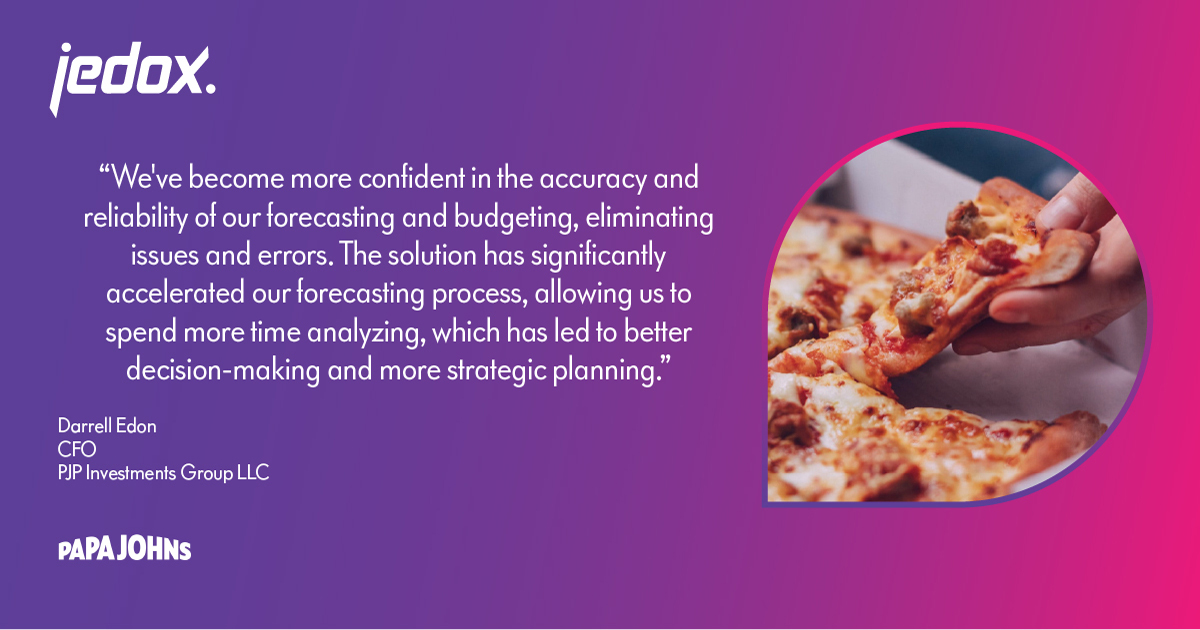Customer Success Story
3x more frequent forecasting, 10x faster scenario analysis, and accelerated budgeting processes


PJP Investments Group LLC—an F&B company wholly owned by Levant Capital, a leading regional private equity firm based in Dubai, UAE—is licensed by Papa John’s Pizza International, USA, for the territories of the United Arab Emirates, Saudi Arabia, & Jordan. It owns and operates over 130 Papa John’s pizza restaurants across the region. With a strong track record of digital “firsts” to make ordering easier, Papa John’s has created a digital experience that customers love. Even after over 30 years, what makes Papa John’s different is its drive to be the best. PJP continues to invest in best practices and stay true to “Better Ingredients. Better Pizza.”
Challenge
Excel-based reporting caused inefficiencies, inaccuracies, and time-consuming work
PJP Investments Group—which operates over 130 Papa John’s restaurants in Jordan, Saudi Arabia, and the U.A.E.—historically managed its budgeting and reporting via Excel. However, as the organization grew, so did its Excel file. In fact, it tripled in size. With separate tabs for each new store and multiple calculations for large amounts of data, even opening the file became difficult.
With up to 20 new stores opening each year, PJP found it increasingly labor-intensive and error-prone to correctly categorize each store by region. From food courts to inline stores to petrol station outlets—each store type needed unique categorization, adding complexity to an overloaded Excel file already prone to crashing.
Due to different data inputs, spelling variations, and inconsistent naming conventions across spreadsheets, accurate analysis was nearly impossible. In short, the financial planning & analysis (FP&A) team was constantly playing catch-up.
With PJP’s high-growth phase and increasing size, it became clear that Excel had outlived its usefulness. Instead, the organization needed an integrated, scalable FP&A solution—one that could handle increasing demands and keep up with PJP’s growth trajectory.
To support the organization’s evolution, PJP selected Jedox’s enterprise performance management (EPM) solution. Customizable and intuitive, it can be tailored to have the look and feel of Excel, making it easier for Finance and other departments to transition to a new interface. Jedox also provided greater control and structure, allowing PJP to build and scale the platform to its current and future needs.
In particular, PJP believed that AI-driven insights and visualization features would be helpful: “We could see how Jedox would not only solve our immediate planning and reporting needs but also serve as a future-proof solution with opportunities for further development as our business continues to grow,” said CFO Darrell Edon.
Solution
Collaborative, controlled planning with real-time comparisons and insights
Before choosing Jedox, PJP considered purchasing a server farm for Excel file storage. However, Finance would have faced complex spreadsheet management, more errors, slow processes, and file crashes—which would have limited time for strategic work.
With Jedox, PJP can focus on its annual budgeting process, as well as monthly and quarterly forecast updates. This makes it possible for Operations, HR, Leasing, Projects, and other departments to actively participate in the budgeting process.
Previously, the Finance team would create and share Excel templates with other departments for input. However, many departments would change the templates by adding or deleting rows, resulting in inconsistencies and errors.
Using Jedox, Finance can control each department’s access and editing rights. For example, HR can only add headcount data, while Operations can only add sales data. The solution has eliminated any risk of departments altering critical formulas and data. Now, it takes just five minutes for Finance to set up sales forecasts for all PJP stores.

Jedox has also enabled stronger cross-functional collaboration. For instance, HR and Operations teams now have greater visibility into their respective data. HR can see headcount and salaries, while Operations can dive into forecasts, budgets, and sales. This provides clearer insights into stores by region and type, which is crucial as headcount and sales are key drivers of restaurant profitability.
The improved collaboration also helps Finance and other departments work in a standard format. For example, Operations can track forecasts against the budget, and HR can monitor headcounts against past data for better planning.
Outcome
An integrated platform that facilitates 3x faster forecasting and 10x faster scenario analysis
With Jedox, PJP enjoys better data control and now forecasts monthly instead of quarterly. In the fast-changing restaurant industry, dynamic forecasting is crucial, especially when new stores open and underperforming ones close regularly.
PJP also has a clearer view of its financial position, enabling Finance to assess performance and spot trends. The FP&A team has evolved from manual spreadsheet work to more effective analysis and forecasting. This means the organization now completes full-year, multi-scenario forecasts in days instead of weeks—leading to better decisions.
Jedox provides PJP with consistent and accurate data across the enterprise. Finance no longer worries about errors like changed formulas or deleted rows in Excel. Now, the team can focus on reviewing strategic decisions and has more time to adjust scenarios as needed.
With more reliable data and greater confidence, Finance is now more aware of forecast accuracy, industry trends, and external factors like political changes or market shifts.
Jedox has helped PJP stay ahead of changes and manage expectations with better visibility into outcomes, allowing them to be proactive rather than reactive. Looking ahead, PJP plans to enhance visualizations and use AI features for automated long-term forecasting, aiming to elevate their forecasting and budgeting processes.
